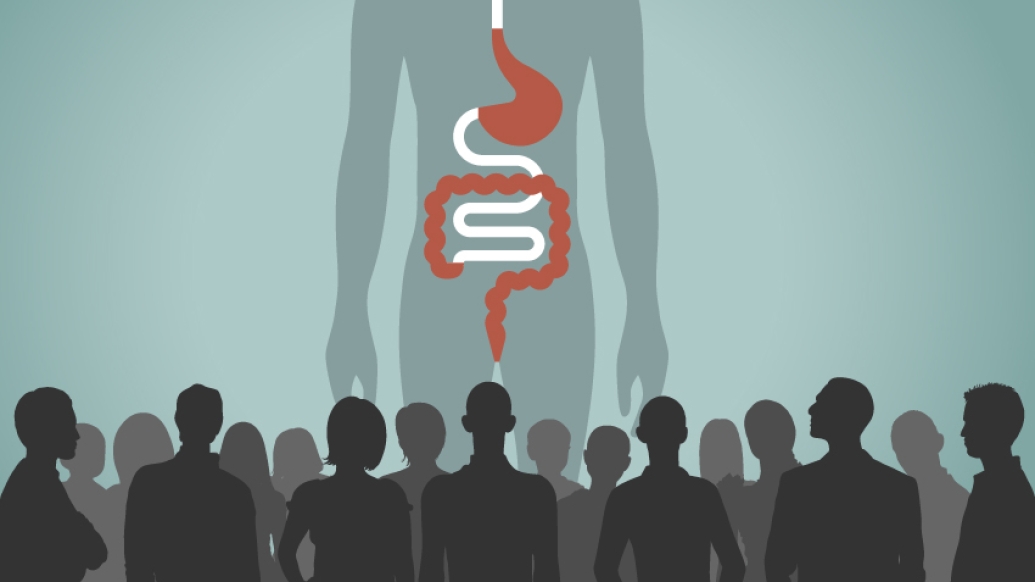Here’s a snapshot of some of Michigan Medicine’s standout work from this year’s gathering of the annual Digestive Disease Week conference.
7:00 AM
Author |

Michigan Medicine gastroenterology and hepatology faculty, fellows, research scientists and midlevel providers converged last week for Digestive Disease Week (DDW), the largest gathering of physicians, researchers and industry working in the fields of gastroenterology, hepatology, endoscopy and gastrointestinal surgery.
LISTEN UP: Add the new Michigan Medicine News Break to your Alexa-enabled device, or subscribe to our daily audio updates on iTunes, Google Play and Stitcher.
The wide range of topics covered by the department's presence at DDW included stem cell biology, epithelial cell differentiation and morphogenesis, visceral hypersensitivity, gastroparesis, gut microbiome, inflammatory bowel disease, gastric metaplasia, intestinal mucosal inflammation and fibrosis, colon and pancreatic cancer, and nonalcoholic fatty liver disease, or NAFLD.
Read on to learn more about some research highlights:
Anti-tumor necrosis factor therapy and post-operative infection
Peter Higgins, M.D., Ph.D., M.Sc., a Michigan Medicine gastroenterologist and director of the Inflammatory Bowel Disease Program at U-M, participated in a multicenter prospective study sponsored by the Crohn's & Colitis Foundation Clinical Research Alliance to determine if anti-tumor necrosis factor therapy is an independent risk factor for post-operative infection after intra-abdominal surgery.
The study assessed 955 patients with inflammatory bowel disease, or IBD, undergoing intra-abdominal surgery in 17 different sites. Forty percent of the patients had pre-operative anti-TNF exposure, or exposure to TNF inhibitors, which are drugs commonly used to help treat ulcerative colitis and Crohn's disease through stopping inflammation.
Among the 40 percent, nearly 70 percent of the patients had detectable anti-TNF levels, while infection rates were similar in anti-TNF-exposed and unexposed patients.
"This demonstrated that the pre-op uses of anti-TNF drugs, as determined by history or drug levels, was not an independent risk factor for post-op infections in a large prospective multicenter cohort," says Higgins.
IBS, SI deficiency and FODMAP
Up to 60 percent to 70 percent of patients with irritable bowel syndrome (IBS) respond to elimination diets, or eating plans designed around removing specific foods to achieve various health benefits. This includes the low FODMAP diet, an elimination diet that removes carbohydrates assumed to prompt IBS symptoms.
This inspired Michigan Medicine gastroenterologists Shanti Eswaran, M.D., and William Chey, M.D., to study whether IBS patients who are symptomatic carriers of the gene for sucrase-isomaltase (SI) deficiency, or recessive mutations and variants in the SI gene, were less likely to benefit from a low FODMAP diet than non-carriers of the gene.
In order to do so, the two doctors analyzed genetic samples from IBS patients previously included in a published randomized controlled trial of the low FODMAP diet where they were analyzed for the SI genotype.
Their study revealed that recessive mutations or SI variants in IBS patients were associated with a three to fourfold reduction in the likelihood of responding to dietary approaches that restrict the intake of carbohydrates and, in particular, the low FODMAP diet.
"Through our work, we were able to conclude that IBS patients who do not respond to dietary interventions like the low FODMAP diet may be SI-deficient," says Chey. "And when this is the case, it makes sense for different therapeutic approaches to be considered for patient care."
H. pylori and the incidence of autoimmune diseases
Historically, Helicobacter pylori (H. pylori) has been associated with a lower risk of developing immune-mediated disorders.
This notion led John Kao, M.D., a Michigan Medicine associate professor and gastroenterologist, and his Taiwanese colleagues to study the effects of treating H. pylori on the incidence of autoimmune diseases, including IBD.
The team utilized the National Health Insurance Research Database in Taiwan, where the prevalence of H. pylori in patients approaches 80 percent. Of the 1 million individuals sampled, nearly 80,000 eligible patients were included in the study.
MORE FROM MICHIGAN: Sign up for our weekly newsletter
Interestingly enough, the collaborative team found that the treatment of H. pylori infection is associated with a significant increase in the risk for acquiring an autoimmune disease, including IBD, and impacting overall mortality rates.
"It is known that H. pylori infection is associated with a lower risk of IBD, but this is the first study to show that treating H. pylori increases one's risk of developing IBD," says Kao. "Our study has global implications and cautions against population screening programs, as eradicating H. pylori may increase the incidence of IBD in those regions."
Overall, this study highlighted the potential immunomodulatory benefits of being colonized with H. pylori.

Explore a variety of healthcare news & stories by visiting the Health Lab home page for more articles.

Department of Communication at Michigan Medicine
Want top health & research news weekly? Sign up for Health Lab’s newsletters today!





